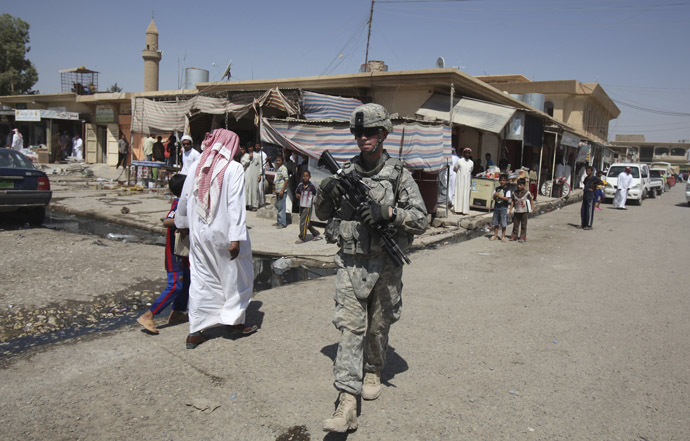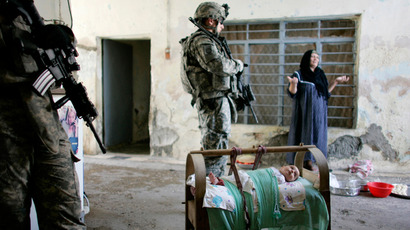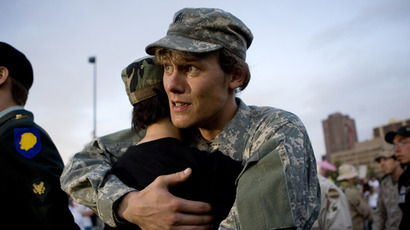Peace, but no reconciliation: Decade after Iraq, US vets struggling to justify war
Iraq is marking 10 years since the ousting of Saddam Hussein, in an overthrow triggered by a US invasion. In the last few months alone, 200 civilians have been killed and more than 800 injured as the country remains unstable and torn by violence.
The Iraq War – which since 2003 has caused well over 110,000
violent deaths according to several surveys – has also reverberated
throughout the country that led the invading coalition. About 4,500
US soldiers were killed in Iraq between 2003 and 2012, but many
more suffered from post-war psychological trauma.
Recent research has revealed that nearly half of the 2.2 million Iraq and Afghanistan veterans who served in the US Military have experienced post-traumatic stress disorder (PTSD), and experienced other mental, physical and financial problems as they struggle to readjust to civilian life at home.
Iraq War veteran Edward Chin, who appears in the legendary video of the toppling of Saddam Hussein’s statue, has told RT that he is still searching for reasons to justify the bloody conflict.
RT:Ten years have passed since you essentially became a symbol of the US occupation and invasion in Iraq. You were 23 at the time when you climbed that statue. What do you know about the Iraq War now that you didn’t know then?
Edward Chin: What I know is that it’s lasted 10 years longer than we expected, they’re still struggling to rebuild the country, to have the stable government.
RT:You climbed that statue of Saddam Hussein and wrapped its face in an American flag. Looking back on your actions: Was that an appropriate thing to do for a foreigner coming in, invading a country, climbing a statue of a man who was the leader of that country and wrapping the face with an American flag?
EC: I couldn’t understand how Iraqi civilians would see it as a symbol of occupation. The reasons why we did, it was for us: We’d been in Iraq for over a month, and finally got to Baghdad. We were hoping that… it would mark the end of the war, we’d finally go home back to our families, that was the point to us. And we hadn’t seen an American flag for so long. It wasn’t something we did just to show our occupation of the country. We were spurred by the moment.
RT:What do you know about the US foreign policy now that you didn’t know then?
EC: We aren’t going to be told the truth, you know, about what happens. That sounds as hard to accept that you just come out of the… war to be able to control oil in that region. Of course, we’re not just going to come out and say that. We’re the military. We do what we’re told. We hoped that the right decisions are made. Once we dare, you know, we’re going to fight over honor.
RT:What do you think the war was for?
EC: I personally think it was to gain a foothold there, to stabilize the region. I don’t believe, you told me, it was for weapons of mass destruction. So a lot of lives lost, it was definitely not worth it. As we’ve seen, today there are still no weapons to be found. It would be worth it if it was to free a country of a dictator. But then, if that was our reason, there are lots of other dictators in the world that need to be taken out, too. I hope that it was for the right reason, I look for the right reasons. How can I not, in a way? It would be too sad for me if the reasons weren’t justified.

Meanwhile, Iraq war veteran Emily Yates told RT that it is now quite clear for her that Washington’s main reason for going into the conflict was the Iraqi oil. But although the American public was made to think the war was justified by the state and the media, Yates believes the conflict’s financial cost alone could have paid for a better alternative for the US.
RT:What do you know about the war in Iraq now that you didn’t know then?
Emily Yates: I know now that it was entirely about oil, at least for the most part, judging from the outcome, anyway… Big oil has been proven to be the big winners in the Iraq war, and the Iraqi people – and the American people – have turned out to be the big losers.
RT:What do you think about the different role America is playing in Iraq, than they were saying they were doing ten years ago?
EY: It was really very clever, strategically speaking – it was well-played to the American public. My job was a public affairs specialist in the military, that’s their name for a journalist... My role was to basically make the war sound really wonderful to those of us who were fighting it. You keep the morale up, of course.
But I knew that Saddam didn’t have weapons of mass destruction, because I’ve been following the news coming out of that, following the reports. And I knew it was not, you know, really, about liberation, as soon as I saw the huge mess that we made of the infrastructure in Iraq, and the fact that still to this day corporations that received these ginormous, multibillion-dollar contracts to rebuild Iraq’s infrastructure still haven’t done that, and they don’t even know where the money has gone.
So seeing the way I was being told to sell the war to the
soldiers, and the way the media narrative seemed to change – even
the regular mainstream media that wasn’t ostensibly pro-military
was still spouting the official line, contributing to all the
fear-mongering. And, you know, this whole mentality the Americans
still have that we were completely justified in going to Iraq. Even
though the estimated projected cost of the Iraq war would be $2.2
trillion, and that added to the interest on the debt that we took
out to pay for the war… [is] $3.6 trillion – that could have paid
for us to get about halfway to sustainable, renewable
resources.
‘Media and politician’s lies crumbled in front of our
faces’
The public information campaign initiated during the Bush era created a false sense of a military mission prior and during the invasion of Iraq. For many like former soldier and now peace activist, Michael Prysner, the situation became crystal clear once the soldier’s on the ground realized that they were being lied to.
RT:What made you change your mind so substantially about what happened ten years ago?
Michael Prysner: I think I will start by saying that I
was someone who went into Iraq war fully believing that it was a
good thing. Volunteering to be in the invasion of Iraq, willing to
die or lose limbs for a cause I really trusted that this government
was telling the truth about. And that changed really quickly as the
months went on in Iraq and the real things that did it for me, was
witnessing all of the lies told by the Bush administration really
crumble in front of our faces.
The main thing being interactions with the Iraqi people, who we were told we were liberating, who we were told would be happy that we’re coming into their country… and seeing what was being done to them and how they oppose our presence there. And also realizing that the people we were told were our enemies, people we were told we should be fighting were exactly like my family and neighbors here at home and that I had so much in common with them, yet I was told by these multi-millionaire politicians that they are the enemy and we have to fight them. And so like many other people who went to Iraq and Afghanistan, it was our first-hand experience on the ground and all of the lies and distortions put out by the US media, by the politicians, really made things just fall apart.
RT:The Iraqi Prime Minister is saying that the people there are better off there now than they were under Saddam Hussein- true or false?
MP: I would say the Prime Minister is better off now than under Saddam Hussein, but for millions of Iraqis, the country is a complete catastrophe, the effects of war are a complete catastrophe. And looking at today, the services that are available, the corruption in the government - all of the things the US demonized the Saddam Hussein government for, you can find ten times worse now in post-war Iraq. And so Iraq has a lot of work to do but Iraq will rise from the ashes will stand strong one day.
Violence, death and looting – all the new generation knows about US foreign policy
The American campaign in Iraq has created an entire generation both at home and abroad that has known no peace, Iraqi veteran and peace activist has told RT.
RT:It is a big jump to go from a soldier to peace activist, what made you do it?
Jayel Aheram: I was in high school when the fall of Baghdad happened and all of my adult life I’ve never known peace. From 2001 up until now, much of my adult life, all I’ve known is war and that to me is really unfair. I consider myself lucky to know that when I was a kid that I knew peace, not so much for the kids that are growing up in Afghanistan, the kids growing up in Iraq and the kids growing up in America, where basically all they know of foreign policy now is how their country interacts with other countries is violence, death and looting.
RT:Are the people in Iraq, the everyday people that you met, are they better off without Saddam Hussein?
JA: I do not know. It is kind off irrelevant to this point, because what we did was to replace Saddam Hussein a tyrant, with this new one Maliki who is even going to be an even bigger tyrant. So America is funding this guy to the tunes of millions of dollars in weapons and aid, for what, for what purpose? So he can consolidate even more power in Iraq and become the next Saddam. The Iraqi people were better off with Saddam whom we created, helped create, put in power, so they are going to be subjected to decades of an American backed dictator, once again.














